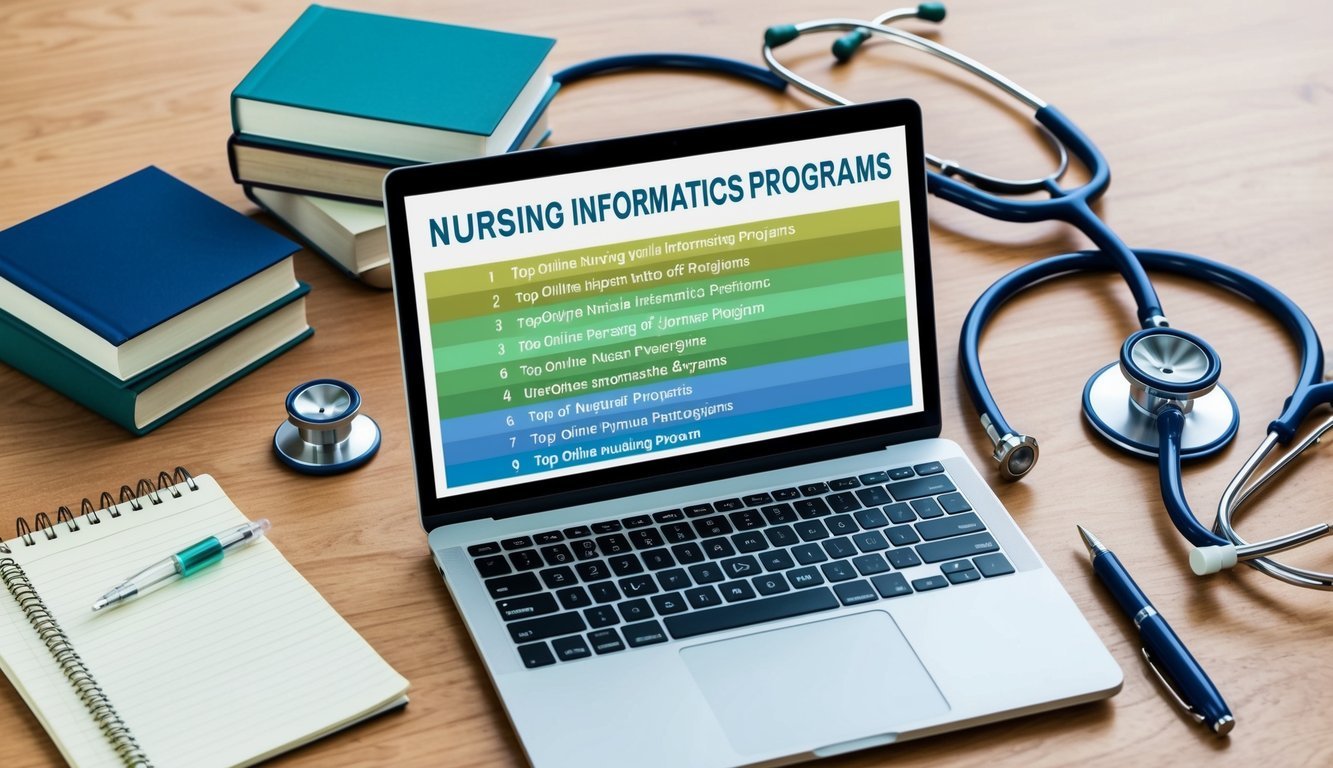Nursing informatics is an essential field that combines healthcare with data management and technology.
As the demand for professionals skilled in this area grows, more educational institutions are offering online master’s programs tailored to this discipline. Finding the best nursing informatics programs online can enhance your career prospects and equip you with valuable skills necessary for modern healthcare.
Many accredited programs provide flexible online options, allowing you to balance your studies with professional and personal commitments.
By considering factors such as tuition, course offerings, and faculty expertise, you can make a well-informed decision that aligns with your career goals.
University of Maryland School of Nursing

The University of Maryland School of Nursing offers a robust online Master’s of Science in Nursing (MSN) program with a specialty in Nursing Informatics.
This program is designed to prepare you to manage and communicate data effectively in nursing practice.
You can complete the program entirely online, which provides flexibility for your schedule.
You will take 1-2 online courses while working full-time, allowing you to advance your education without interrupting your career.
The curriculum integrates nursing science with information and analytical sciences.
This combination equips you with the skills to enhance patient care and outcomes.
In addition to the MSN, the school also offers a Nursing Informatics Certificate.
The certificate is ideal if you already hold a master’s degree in another specialty area.
This program will help you develop or enhance your informatics skills.
For more details about the program and to explore your options, visit the University of Maryland School of Nursing website.
2) Vanderbilt University School of Nursing
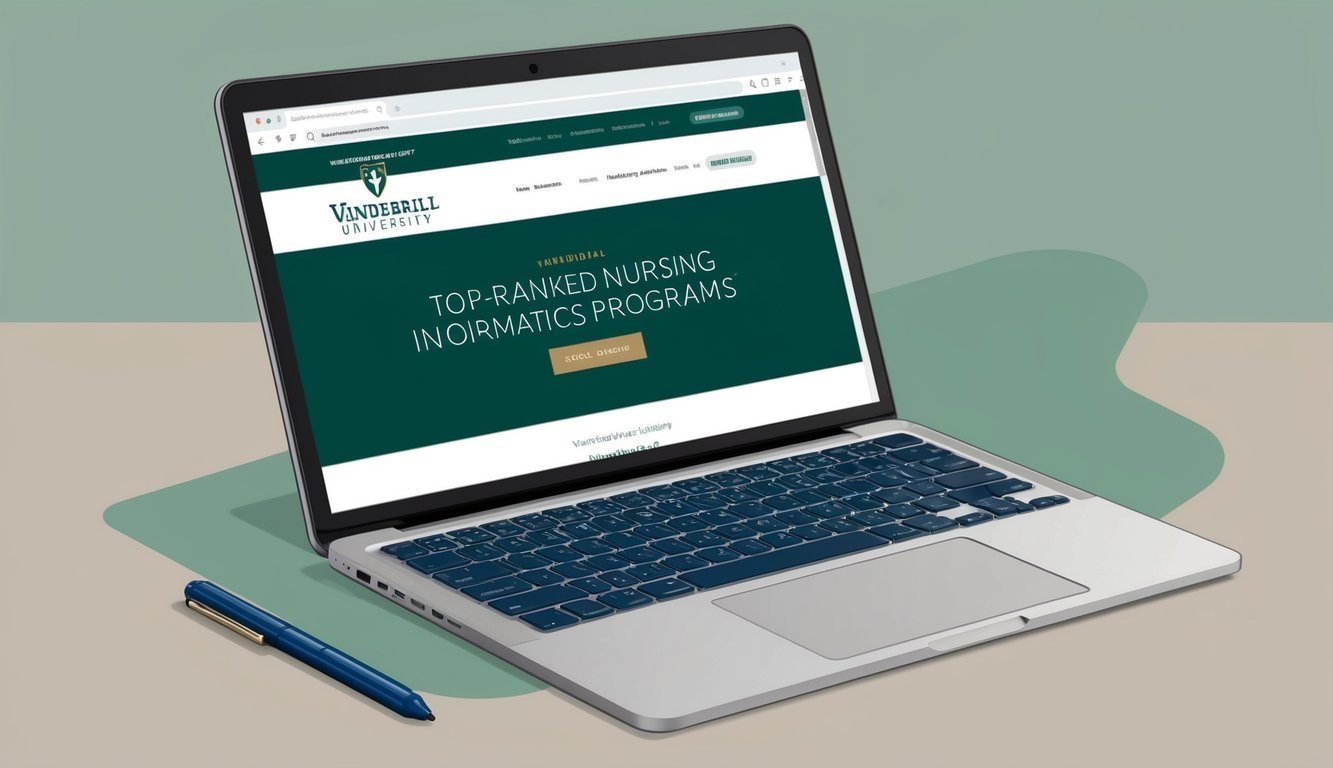
Vanderbilt University offers a comprehensive Nursing Informatics program that combines academic rigor with practical experience.
You can complete this program in a part-time format over six semesters, allowing you to maintain your full-time job.
The curriculum utilizes advanced online learning technologies, promoting virtual coursework and scholarly interactions.
This flexibility enables you to study while applying your knowledge in the workplace.
You will engage in individually tailored practicums, working with preceptors to address real-world challenges in healthcare.
This hands-on approach enhances your learning experience and prepares you for leadership roles.
Vanderbilt emphasizes equal opportunity and inclusivity within its programs.
The institution is committed to fostering a diverse learning environment for all students.
For more information on the Nursing Informatics program, visit the Vanderbilt University School of Nursing website.
3) Duke University School of Nursing
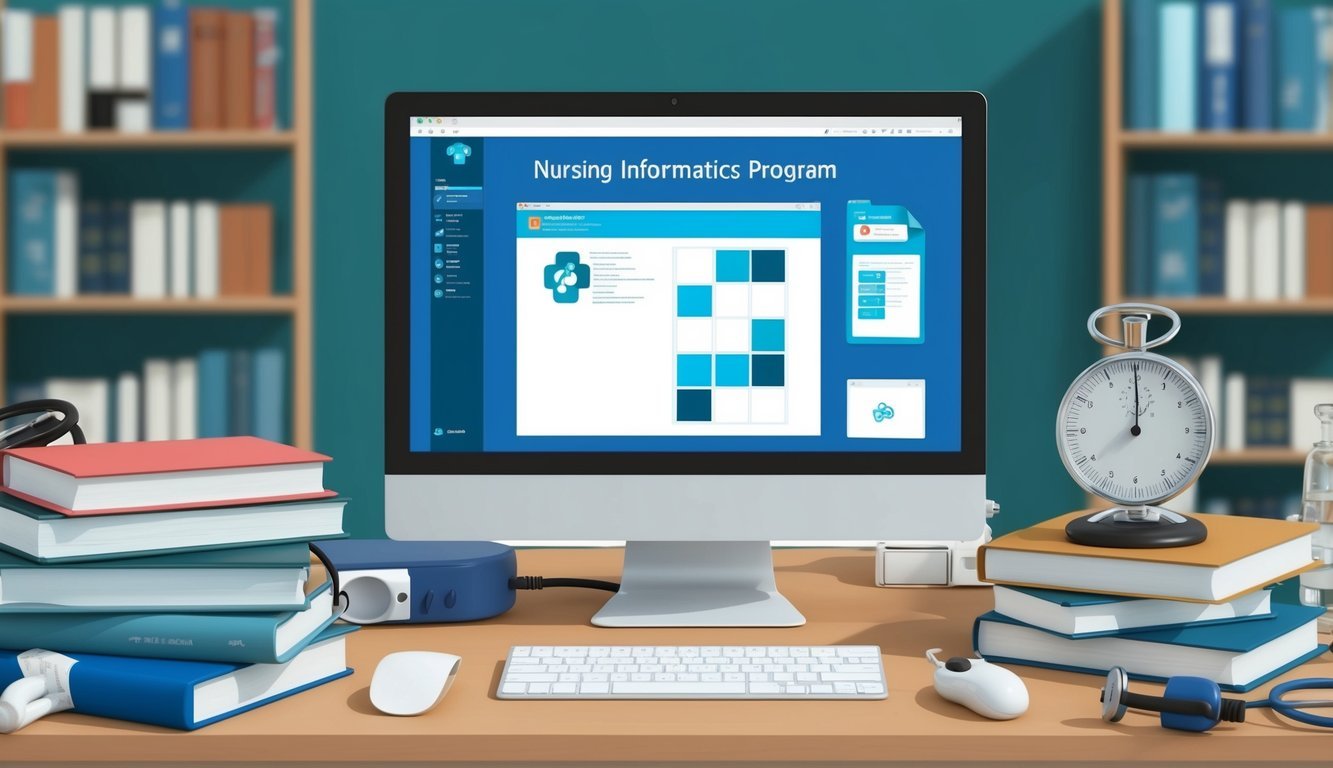
Duke University School of Nursing offers a Master of Science in Nursing (MSN) with a specialization in Health Informatics.
This program combines distance-based learning with hands-on training.
You will benefit from a curriculum designed to equip you with the skills needed to excel as a nursing informatics specialist.
The program is known for its flexibility, allowing you to balance your education with personal and professional commitments.
Duke’s online format is well-suited for students across the United States.
You’ll interact with faculty who are leaders in the field and have extensive clinical experience.
This adds valuable real-world insights to your learning experience.
The collaboration with Duke Health enhances the program’s relevance in the ever-evolving healthcare landscape.
You can expect to emerge well-prepared for a career that increasingly intersects technology and patient care.
For more details, you can explore the Health Informatics program at Duke University School of Nursing.
4) University of Minnesota School of Nursing
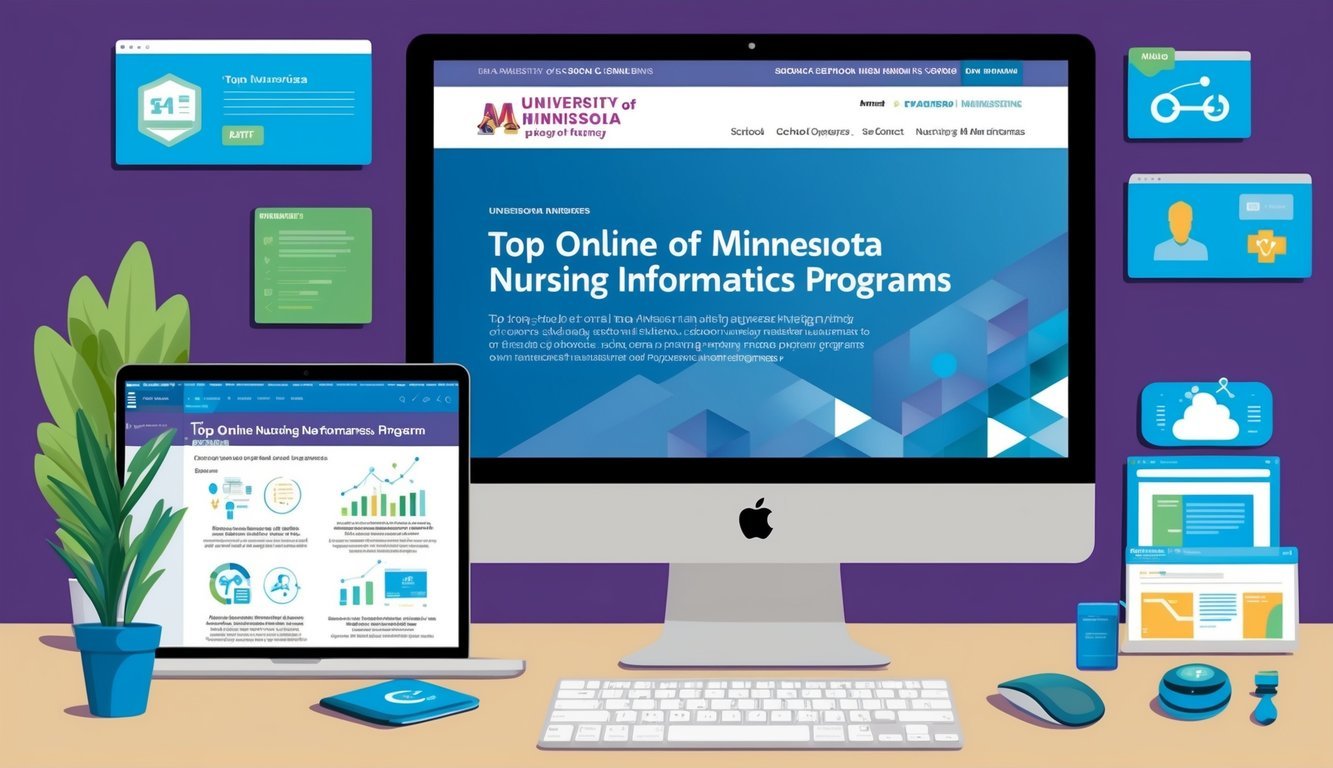
The University of Minnesota School of Nursing offers a highly regarded Nursing Informatics program.
It is ranked #2 in the United States by U.S. News and World Report.
This program emphasizes both leadership and practical applications in nursing informatics.
You will have the opportunity to engage with a curriculum that prepares you for the complexities of healthcare technology.
The Doctor of Nursing Practice (DNP) in Nursing Informatics features a flexible online format.
You can choose between a three-year or a four-year plan, which includes brief campus visits for core courses and advisement.
The Center for Nursing Informatics at the University champions innovation and research in the field.
This center fosters collaboration and provides valuable resources to students and professionals.
5) Johns Hopkins School of Nursing
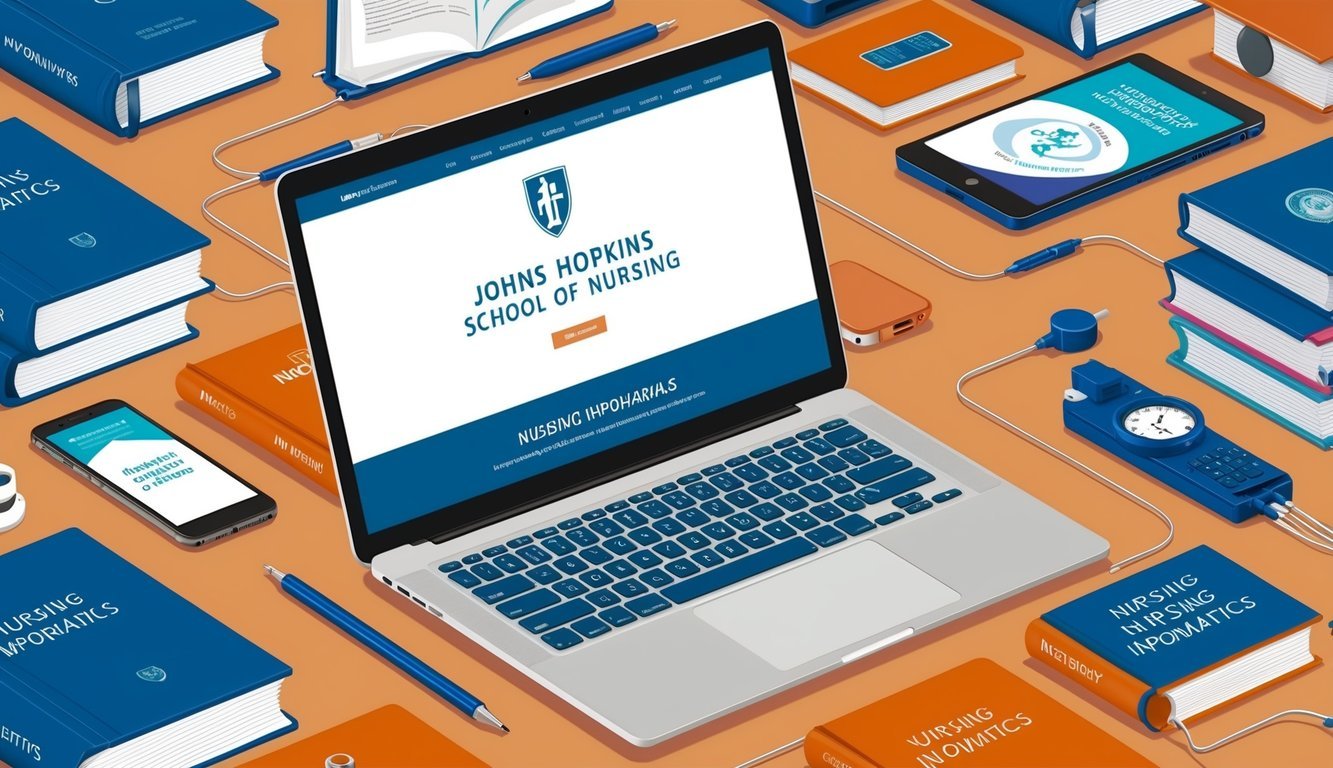
The Johns Hopkins School of Nursing offers a robust online program in health informatics.
This program is designed for healthcare professionals seeking to enhance their technology skills and knowledge in informatics.
You can pursue a post-baccalaureate Applied Health Informatics Program.
It focuses on equipping you with the necessary tools to better manage and interpret healthcare data.
The program is structured to accommodate your busy schedule, allowing flexibility in learning.
It features evidence-based education aimed at improving health care outcomes.
For details on the curriculum and application process, visit the Johns Hopkins School of Nursing.
You will find resources and support that help you succeed in your educational journey.
Investing in this program positions you well for various roles in the growing field of nursing informatics.
The knowledge gained can significantly impact your career trajectory in healthcare.
6) University of Pittsburgh School of Nursing
The University of Pittsburgh offers a comprehensive MSN in Nursing Informatics.
This program is delivered entirely online, making it accessible for working professionals.
The curriculum combines cognitive science, computer science, information science, and nursing science.
You will engage in active learning that includes discussions, research, and problem-solving.
Students also focus on the development and evaluation of information systems that support patient care.
The interactive online classroom encourages networking and community building with faculty and peers.
In addition to the MSN, you can pursue a Post-Professional Certificate in Nursing Informatics.
This program is designed for those looking to advance their knowledge and skills in health informatics.
For those interested in leadership roles, the program equips you with the skills necessary to improve clinical decision-making processes.
Overall, the University of Pittsburgh is recognized for its high-quality education and strong program reputation.
7) The George Washington University
The George Washington University (GW) offers a highly regarded online Master of Science in Nursing (MSN) program.
Ranked No. 8 by U.S. News & World Report, this program integrates online coursework with in-person training in simulation centers.
You will benefit from a unique hybrid learning experience.
The faculty comprises industry leaders who bring real-world knowledge into the classroom.
The program provides you with essential skills in areas such as nursing informatics.
You will learn to leverage data and technology to improve patient care and outcomes, making it a valuable asset to your nursing career.
For those looking to specialize, the MSN program includes coursework specific to nursing informatics, preparing you for roles in this growing field.
To find details about tuition and financial aid, visit the George Washington University School of Nursing.
8) University of Kansas Medical Center
The University of Kansas Medical Center offers a Master of Science in Health Informatics program designed to prepare you for advanced roles in healthcare informatics.
This program emphasizes the integration of technology into healthcare systems.
You will gain skills in data management, healthcare analytics, and project management.
The program is accredited, ensuring you receive a quality education.
Accreditation has been reaffirmed through 2030, which speaks to its ongoing commitment to excellence.
You can contact the program for more details about the curriculum and admissions.
For accreditation inquiries, you may reach out to CAHIIM at their website.
With online learning options, it allows for flexibility, making it easier for working professionals to balance studies with personal commitments.
9) Oregon Health & Science University
Oregon Health & Science University (OHSU) offers a highly regarded program in Health and Clinical Informatics.
You can choose between an online or on-campus format, which provides flexibility to fit your schedule.
The Master of Science in Health and Clinical Informatics program includes 55 credits for the thesis option and 49 credits for the non-thesis path.
This structure allows you to tailor your education to your specific career goals.
OHSU’s program has received accreditation, reaffirmed through 2023, ensuring that you receive quality education that meets established standards.
For more details on accreditation, you can visit the Department of Medical Informatics and Clinical Epidemiology.
OHSU is consistently ranked among the top institutions for nursing informatics.
Its dedicated faculty and comprehensive curriculum will equip you with the necessary skills to excel in the field.
You can learn more about this program and its requirements by visiting the Health and Clinical Informatics Major page.
10) The Ohio State University College of Nursing
The Ohio State University College of Nursing offers a highly regarded online Master of Science in Nursing program.
This program has been recognized for its quality and effectiveness in preparing nursing professionals for leadership roles.
You will benefit from a curriculum that covers essential skills in healthcare innovation and informatics.
Courses include topics such as healthcare policies, technology, and organizational leadership.
The program is designed for both entry-level and mid-career nursing professionals.
It provides the flexibility to manage your studies alongside professional commitments.
Ohio State’s College of Nursing has achieved impressive rankings.
It was recently ranked No. 1 in the nation for online master’s programs by U.S. News & World Report.
This recognition reflects the university’s commitment to enhancing access to quality education.
The online format allows for greater flexibility, making it easier for you to balance work and studies.
For more information, you can explore the program details on their official website.
Understanding Nursing Informatics
Nursing informatics integrates nursing science with information management to enhance patient care.
This field emphasizes the use of data and technology to improve healthcare outcomes, streamline workflows, and support clinical decision-making.
Role in Healthcare
In healthcare, nursing informatics professionals play a critical role in managing patient data and facilitating communication among healthcare providers.
You are responsible for implementing electronic health records (EHR) and ensuring compliance with regulations.
Nursing informatics professionals analyze data to identify trends and improve patient care practices.
This includes supporting evidence-based practices and optimizing clinical pathways.
Your contributions may involve training staff on new technologies and ensuring that the systems meet the needs of both patients and providers.
You become a bridge between clinical staff and technology, improving outcomes through better data management.
Key Competencies
To excel in nursing informatics, certain competencies are essential.
Key skills include proficiency in health information systems, data analysis, and project management.
You should also be familiar with regulatory standards governing health information.
Critical thinking and problem-solving skills enable you to address complex issues that arise within healthcare settings.
Effective communication is vital, as you’ll need to convey technical information to both clinical and non-clinical staff.
Additionally, understanding interdisciplinary collaboration helps enhance system usage across healthcare teams.
You must stay updated on emerging technologies and trends to ensure your skills remain relevant in this evolving field.
Through these competencies, you will elevate the role of nursing informatics, ensuring better care delivery and improved patient outcomes.
Evaluating Online Programs
When selecting an online nursing informatics program, careful evaluation is crucial.
You should pay special attention to accreditation and curriculum features to ensure you receive quality education.
Accreditation Importance
Accreditation serves as a key indicator of program quality.
Programs accredited by recognized bodies, such as the Commission on Collegiate Nursing Education (CCNE) or the Accreditation Commission for Education in Nursing (ACEN), adhere to strict educational standards.
This status ensures that your degree holds value with employers and regulatory bodies.
Additionally, many states require graduation from an accredited program for licensure.
It may impact eligibility for financial aid, scholarships, and advanced education opportunities.
Therefore, it’s essential to verify the accreditation status of any program you consider to protect your investment in your education.
Curriculum Considerations
Make sure the curriculum aligns closely with your career goals in nursing informatics.
Examine key components such as core coursework, electives, practicums, and capstone projects.
Relevant subjects often include health information systems, data analytics, and project management.
You want to ensure the program covers a balance of theoretical knowledge and practical skills.
Look for programs that incorporate real-world applications, such as internships or hands-on projects.
Some programs might offer specializations in areas like clinical informatics or public health informatics, allowing you to tailor your education.
Finally, compare the total number of credit hours and the flexibility of course delivery methods, whether synchronous or asynchronous.

